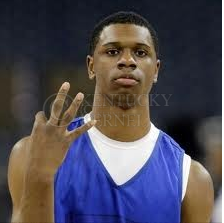‘I can’t leave the BBN just yet’

May 8, 2011
At 4:18 p.m. — 18 now-pardonable minutes late — Terrence Jones’ “50-50” feeling became 100-0, at least officially. He had waved his hand over the metaphorical NBA hat and landed instead, this time irreversibly, on UK.
The tweet — simple, no teasing build-up, and worded as if PR had absolutely nothing to do with the message — instantly generated an overwhelming sense of excitement for a season still months away. Deservedly so; a lineup where Kyle Wiltjer is the eighth man of the bench already seems unfair against any team that doesn’t have North Carolina on the front of its jersey. How the pieces will fit, who starts, who emerges as the go-to guys when nearly anyone could be, all these and more will be entertaining to think about and watch develop. But that will come later.
Jones’ decision had import beyond next year’s national championship hopes. It showcased what Calipari’s recruiting style can optimally do. After his first year, where all four freshmen who thought about making The Leap successfully did, the one-and-done strategy was derided. Too much yearly roster turnover would make it impossible to construct a team steeped in both the necessary talent and experience to win a championship. One year’s freshmen class would make costly mistakes when it mattered, and then next year’s freshmen class would then do the same thing. This year proved that to a degree; Calipari admitted that the Reliant Stadium lights were too bright in the Final Four (not literally), and UK largely shot its way back to Lexington.
Next year, UK will have at least one senior in Darius Miller leading the charge, and possibly two depending on DeAndre Liggins’ decision (coming Monday). It will have a smattering of juniors who may or may not end up mattering, and it will have two supremely talented freshmen in Jones and Doron Lamb, who combined represent the first one-and-not-dones of the Calipari era.
During the latter portions of the season, when talk began circulating about who would jump to the NBA, I wondered how much the one-and-done culture at UK, whether real or perceived, might influence their decisions. Seeing the five Draft Cats get to the NBA so quickly played a large role in recruiting — remember Calipari called it the “biggest night in UK history” — and it seemed plausible that getting to the NBA quickly was a primary goal for anyone coming to UK. Would they feel like a failure if they WEREN’T “good” enough to go professional after a year? Would they feel like something wrong must have happened to them, as they watched other freshmen ditch UK jerseys for an unknown NBA team’s cap? Would their preconceived notions from before freshmen year of what they were supposed to be doing after their freshmen year alter, in any way, their judgment?
Apparently not, at least In Jones’ case. He passed up a top-15 pick because he ‘can’t leave BBN just yet,’ although some might interpret that to mean he just wants to become a higher draft choice in 2012. (Quick interjection: Jeff Goodman’s assertion that Calipari’s salesmen skills played a large role in Jones coming back, but I tend not to think so. Calipari is a master salesmen when persuading recruits to come to him; he has never seemed to act selfishly in players’ NBA decision.)
Jones might end up being a rare case; but at this rate, isn’t that all UK might need? It’s hard to project outward too far, but considering that Jones’ roster status essentially represented starting over with a young seven-man rotation or having a loaded team from the beginning of the year, it seems it might be the case. Of course, the opposite could realistically happen in the near future; if one recruiting class doesn’t quite come together, ‘depleted’ would be the keyword of that particular summer.
But it didn’t happen, at least not this year, and now we have a best-case scenario, one where Calipari has a wide variety of talented youth and talented experience to meld as he sees fit. I personally see this type of roster, rather than last year’s stretched-thin one, as being more representative of the normal case. Judging how Calipari’s methods of building a team after one year seemed far too short-sighted to me, although judging after his second might be an exercise in overreaching conjecture as well.































































































































































